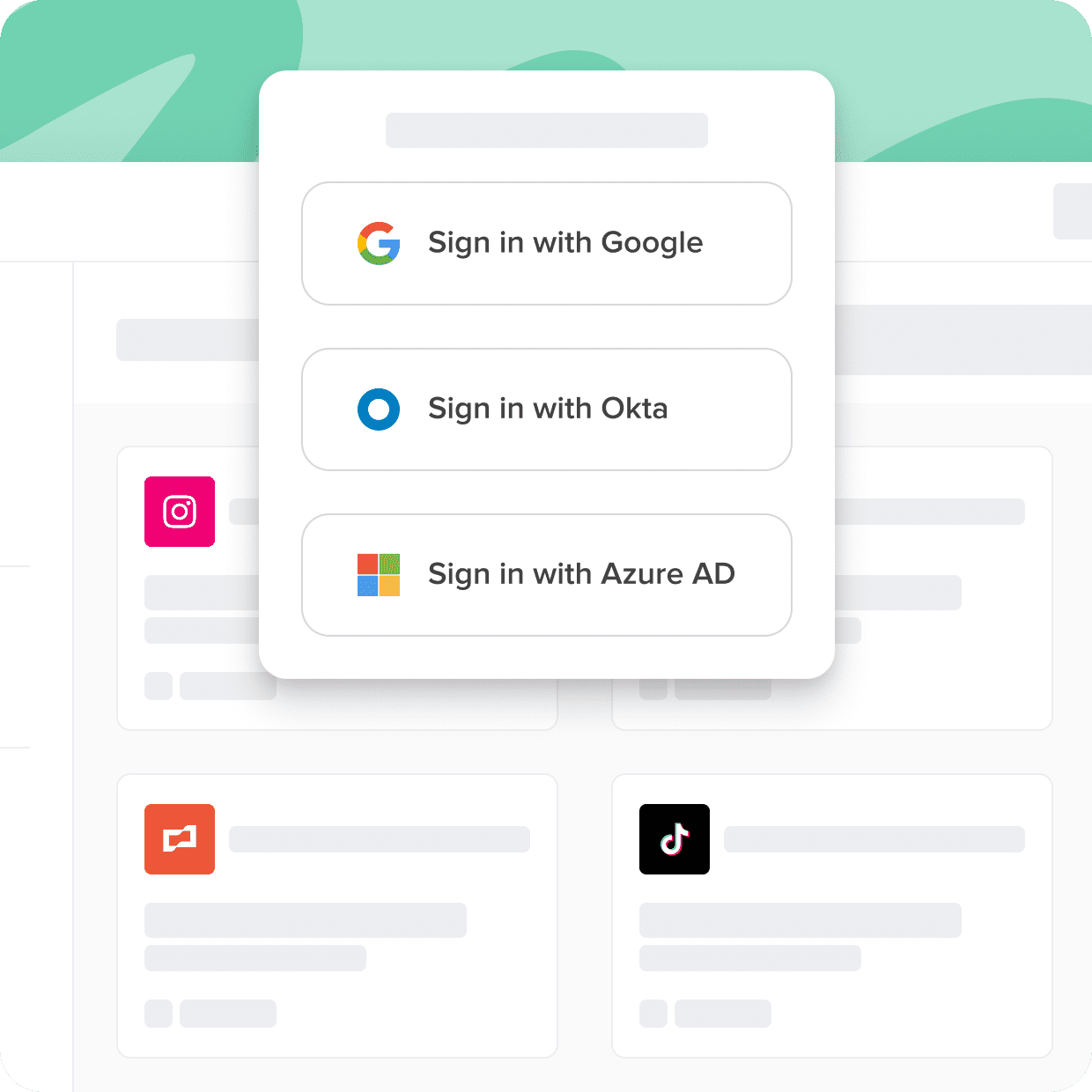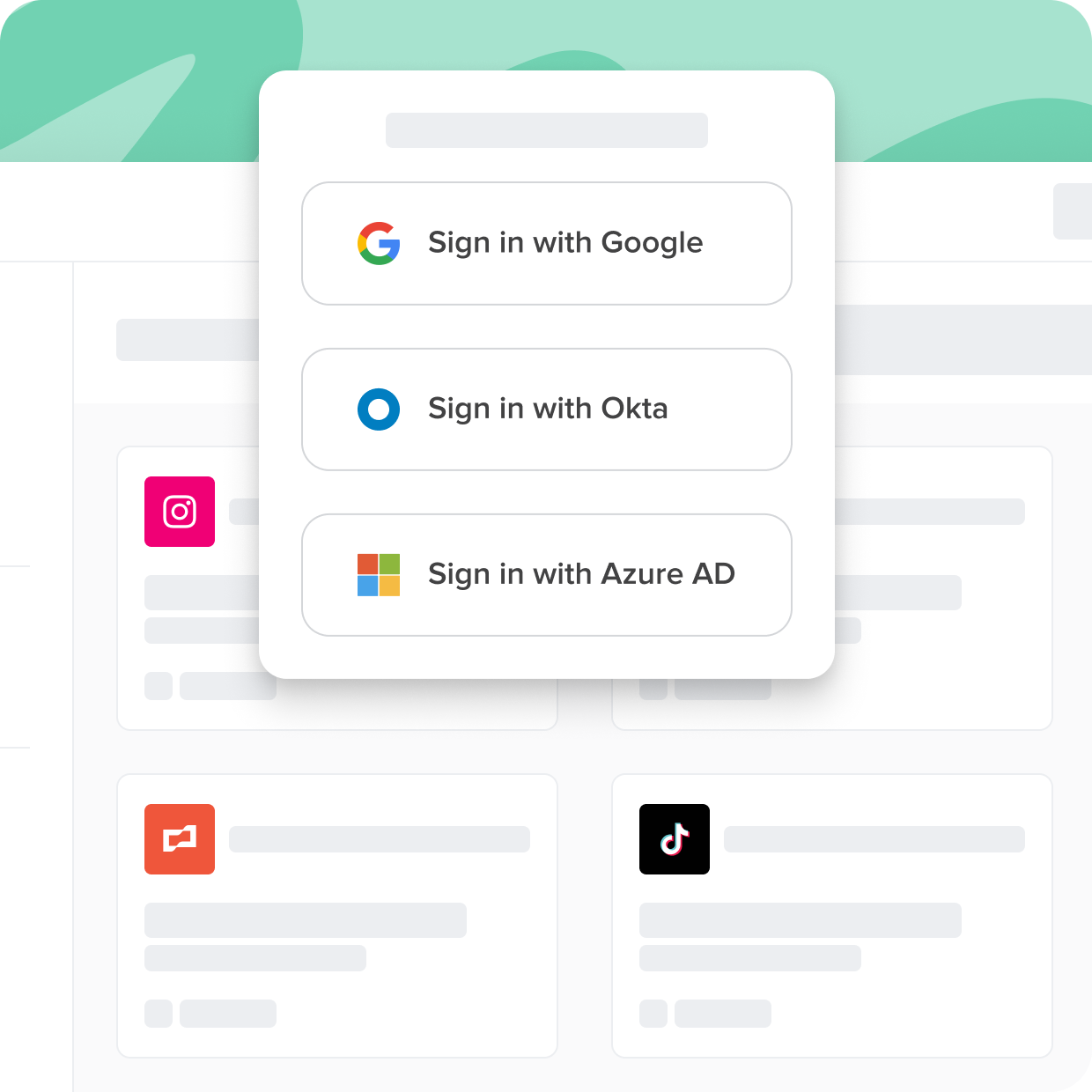Single sign-on (SSO) software is a fantastic technology allowing businesses to eliminate password reuse and simplify the login process. Unfortunately, many corporate applications don't support the SSO standard and can't reap all the benefits. The applications that fall into this category are best called "nonfederated." Nonfederated applications are a new category that is becoming increasingly challenging for businesses to manage and secure effectively, yet increasingly critical for businesses to succeed.
Cerby connects all of your apps to your SSO tools, even if they don't support the SSO standard. In this guide, you'll learn about SSO software, the history, and the benefits.
Streamline Access With Single Sign-On
Not all apps are created equal. Some come with security gaps and complexities that can hinder user adoption and put sensitive data at risk. With Cerby, you can ensure secure and seamless access to all your applications, regardless of their support for standards like SSO.
With Cerby You Can

Close the identity gap

Universally enforce 2FA

Eliminate the SSO tax
SSO Software
Single Sign-On (SSO) software is a tool that enables users to access multiple applications using a single set of login credentials. SSO software is an essential solution for anyone who navigates several online applications to complete a task. Users can go through the SSO portal, which will authenticate credentials before allowing access to various applications.
In general, the objective is to simplify the login process and save users time logging into each application separately. Several top providers offer SSO software services with different features and pricing. Some of the notable providers of SSO software services are:
- Okta
- LastPass
- OneLogin
- Microsoft Azure
- Auth0
These providers offer different SSO solutions and cater to multiple audiences, including businesses, educational institutions, healthcare providers, and government agencies.
SSO login software is primarily intended for web users who must access multiple applications using login credentials. It's especially useful in companies and organizations where employees must log in to different tools and services to complete their daily tasks.
Using SSO services, employees can do their jobs more efficiently without the need to log in multiple times or keep track of different login credentials. This is highly advantageous for websites and services that provide access to sensitive information and must be protected. An SSO portal can offer various security features like two-factor authentication and multi-factor authentication. It helps ensure that only authorized users can access the site, application, or service.
It is undeniable that SSO software is a critical tool for individuals, organizations, and even government agencies to manage different login credentials across multiple platforms and applications. By using SSO software, users can access multiple applications simultaneously using single sign-on login, making for a smoother workflow. It enhances security by providing additional security features like multifactor authentication. The wide range of SSO providers allows users to choose the solution that best suits their needs, whether it's business, education, healthcare, or government agencies.
What Is The Purpose Of SSO?
The purpose of SSO software and solutions is to streamline the login process across various applications while improving security and reducing costs. SSO software utilizes a single set of login credentials to authenticate users across multiple applications without requiring them to enter a unique username and password for each individual application. Organizations can benefit from SSO in several use cases, including in large enterprises with multiple software applications, cloud-based applications, and legacy systems.
One single sign-on example would be the use of a Google account to sign in with almost any application or service that has opted-in to use their service (e.g., Asana). This is the true SSO meaning.
There are many strategic advantages to utilizing this kind of software. One of the primary benefits of SSO software is that it helps to reduce password fatigue, which is a major cause of security vulnerabilities. By using a single set of login credentials across all applications, SSO software reduces the risk of weak or compromised passwords and improves overall security while ensuring it is easier for users to remember their login credentials.
When considering SSO software, businesses must weigh the different options available and determine what works best for their organization's needs. One consideration is whether to use an open-source identity and access management (IAM) system or a commercial SSO provider.
Open-source IAM offers a cost-effective solution that can be highly customized to suit the organization's needs, while commercial SSO providers can provide secure and reliable solutions with robust support. In summary, the purpose of SSO is to streamline login processes, improve security, and reduce costs to drive efficiency in the organization.
By reducing the number of logins required to access multiple applications, SSO software simplifies the process for users while enhancing security for the organization. When considering SSO software, organizations should weigh options between open-source IAM and commercial SSO providers and determine what works best for their unique needs.
SSO Solutions
SSO is widely used by Software-as-a-Service (SaaS) companies to help users save time and reduce the frustration of having to remember multiple login credentials for different tools. In essence, SSO solutions provide users with one set of login credentials for all the applications in their stack. This means that users can also authenticate across different web domains without having to re-enter their login credentials. For martech, IT, and security teams in SaaS companies, having an SSO solution in place is critical. With an SSO solution, users can securely access the tools they need, while IT and security teams can manage authentication and authorization more easily.
SSO tools also offer benefits like improved security, easier user management, and better compliance. When doing an SSO solutions comparison, SaaS companies need to consider factors like ease of use, cost, and security features. The decision to choose between an open-source or commercial SSO provider can depend on the size of the company and the specific needs of the users. There are several SSO solutions available in the market, each with its own set of benefits and drawbacks. Some of the best SSO providers include Okta, OneLogin, and Ping Identity. Companies can also choose from open-source SSO providers like Gluu or Keycloak. Overall, implementing an SSO solution is an essential step for SaaS companies. Employing the best SSO provider for the company can improve security and ease of use for all users, saving time and increasing productivity.
SSO Service Provider
When looking for an SSO service provider from both a business and team perspective, there are several factors to consider. Organizations need to look for an SSO service provider that can offer seamless and quick integration with their existing systems without disrupting their operations. The type of SSO service provider required should also complement the security and compliance standards of the organization.
Additionally, businesses must determine whether they need an SSO service provider vs. Identity Provider (IdP) to cater to their unique requirements. When using an SSO service provider, businesses must ensure they select one that offers Security Assertion Markup Language (SAML) support. SAML is a vital protocol that allows for the secure exchange of authentication data between an SSO or IdP and a service provider. For instance, a SAML service provider example could provide a single sign-on into Atlassian’s suite of products. Here, Atlassian uses SAML to authenticate and authorize users from a SAML-compliant IdP/SSO.
However, a major challenge is that many applications don’t support the necessary security standards to work with SSO—namely, SAML. Nonfederated applications are a serious security risk, and research from the Ponemon Institute found that they make up a statistically significant percentage of breaches.
Another thing to consider is the ease of use and accessibility of the SSO solution. It should have a user-friendly dashboard and be easy to navigate, as this ensures that the tool can be readily adopted by various teams and users. Additionally, businesses need to decide between a service provider-initiated SSO or an IdP-initiated one.
Service Provider SAML implements service provider-initiated SSO, which the service provider initiates during the growing trend in API-driven applications. This feature ensures that the SSO service provider is accessible to all users from different applications and domains from a single source. SSO provider Google offers this as part of its suite of tools.
When searching for the best SSO providers list, businesses may have a choice between a commercial or open-source provider. While a commercial provider would typically be more expensive, it has the advantage of offering more robust support and seamless integration with other business tools. On the other hand, an SSO provider open-source solution provides a more affordable, customizable option that can be tailored to fit the business's unique needs.
Selecting the right SSO service provider requires careful consideration of several factors, such as the tool's compatibility with existing systems, the protocols supported, the ease of use of the SSO, and whether a service provider or IdP-initiated SSO is required. By taking a closer look at these factors, businesses and teams can make the best decision that meets their unique needs.
SSO Software Open Source
When it comes to self-hosted SSO software options, there are several things that technical teams need to consider, especially if they are looking for SSO software that is open source and uses SAML for identity management. One of the key benefits of using open-source SSO software is that it offers flexibility for customization and can be self-hosted, giving technical teams full control over the infrastructure. This means that the software can be tailored to the organization's specific needs, including security and management requirements.
Technical teams should also assess the platform's security features, including user authentication and authorization procedures, secure communication protocols, and the level of support available.
Open-source SAML SSO and open-source SAML IDP can be crucial consideration for organizations that prioritize privacy and data security since it enables them to authenticate users across applications. Additionally, the open-source nature of the software enables technical teams to customize the solution to their specific requirements, making it an attractive option for organizations.
Overall, self-hosted SSO software that is open source and uses SAML can be a viable solution for organizations looking for a flexible, scalable, and customizable solution. With the right considerations, technical teams can choose the best SSO software open-source option for their organization's specific needs, including open-source SAML SSO and open-source SAML IDP.

